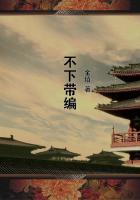He asked me about this idea of the Governor's of getting along without the tenants this year.Hooven wants to stay to tend the ditch and look after the stock.I told him to see you."Harran, his mind full of other things, nodded to say he understood.Presley only waited till he had disappeared indoors, so that he might not seem too indifferent to his trouble; then, remounting, struck at once into a brisk pace, and, turning out from the carriage gate, held on swiftly down the Lower Road, going in the direction of Guadalajara.These matters, these eternal fierce bickerings between the farmers of the San Joaquin and the Pacific and Southwestern Railroad irritated him and wearied him.He cared for none of these things.They did not belong to his world.In the picture of that huge romantic West that he saw in his imagination, these dissensions made the one note of harsh colour that refused to enter into the great scheme of harmony.It was material, sordid, deadly commonplace.But, however he strove to shut his eyes to it or his ears to it, the thing persisted and persisted.The romance seemed complete up to that point.There it broke, there it failed, there it became realism, grim, unlovely, unyielding.To be true--and it was the first article of his creed to be unflinchingly true--he could not ignore it.All the noble poetry of the ranch--the valley--seemed in his mind to be marred and disfigured by the presence of certain immovable facts.Just what he wanted, Presley hardly knew.On one hand, it was his ambition to portray life as he saw it--directly, frankly, and through no medium of personality or temperament.But, on the other hand, as well, he wished to see everything through a rose-coloured mist--a mist that dulled all harsh outlines, all crude and violent colours.He told himself that, as a part of the people, he loved the people and sympathised with their hopes and fears, and joys and griefs; and yet Hooven, grimy and perspiring, with his perpetual grievance and his contracted horizon, only revolted him.He had set himself the task of giving true, absolutely true, poetical expression to the life of the ranch, and yet, again and again, he brought up against the railroad, that stubborn iron barrier against which his romance shattered itself to froth and disintegrated, flying spume.His heart went out to the people, and his groping hand met that of a slovenly little Dutchman, whom it was impossible to consider seriously.He searched for the True Romance, and, in the end, found grain rates and unjust freight tariffs.
"But the stuff is HERE," he muttered, as he sent his wheel rumbling across the bridge over Broderson Creek."The romance, the real romance, is here somewhere.I'll get hold of it yet."He shot a glance about him as if in search of the inspiration.
By now he was not quite half way across the northern and narrowest corner of Los Muertos, at this point some eight miles wide.He was still on the Home ranch.A few miles to the south he could just make out the line of wire fence that separated it from the third division; and to the north, seen faint and blue through the haze and shimmer of the noon sun, a long file of telegraph poles showed the line of the railroad and marked Derrick's northeast boundary.The road over which Presley was travelling ran almost diametrically straight.In front of him, but at a great distance, he could make out the giant live-oak and the red roof of Hooven's barn that stood near it.
All about him the country was flat.In all directions he could see for miles.The harvest was just over.Nothing but stubble remained on the ground.With the one exception of the live-oak by Hooven's place, there was nothing green in sight.The wheat stubble was of a dirty yellow; the ground, parched, cracked, and dry, of a cheerless brown.By the roadside the dust lay thick and grey, and, on either hand, stretching on toward the horizon, losing itself in a mere smudge in the distance, ran the illimitable parallels of the wire fence.And that was all; that and the burnt-out blue of the sky and the steady shimmer of the heat.
The silence was infinite.After the harvest, small though that harvest had been, the ranches seemed asleep.It was as though the earth, after its period of reproduction, its pains of labour, had been delivered of the fruit of its loins, and now slept the sleep of exhaustion.
It was the period between seasons, when nothing was being done, when the natural forces seemed to hang suspended.There was no rain, there was no wind, there was no growth, no life; the very stubble had no force even to rot.The sun alone moved.
Toward two o'clock, Presley reached Hooven's place, two or three grimy frame buildings, infested with a swarm of dogs.A hog or two wandered aimlessly about.Under a shed by the barn, a broken-down seeder lay rusting to its ruin.But overhead, a mammoth live-oak, the largest tree in all the country-side, towered superb and magnificent.Grey bunches of mistletoe and festoons of trailing moss hung from its bark.From its lowest branch hung Hooven's meat-safe, a square box, faced with wire screens.
What gave a special interest to Hooven's was the fact that here was the intersection of the Lower Road and Derrick's main irrigating ditch, a vast trench not yet completed, which he and Annixter, who worked the Quien Sabe ranch, were jointly constructing.It ran directly across the road and at right angles to it, and lay a deep groove in the field between Hooven's and the town of Guadalajara, some three miles farther on.
Besides this, the ditch was a natural boundary between two divisions of the Los Muertos ranch, the first and fourth.














